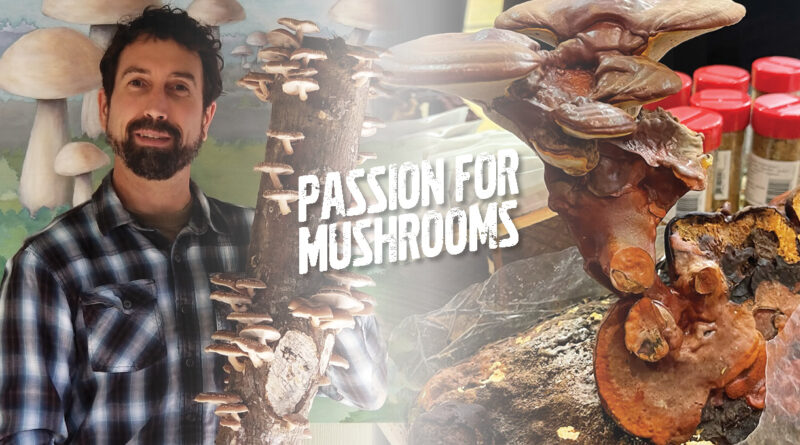Mushroom Production At Fungaia Farm
It’s a crisp and bright November morning, and I am headed to Fungaia Farm, a local mushroom production company born in 2011 that serves my Humboldt County community. Fungaia Farm is owned and operated by local permaculturist Levon Durr, who began this endeavor in 2011.
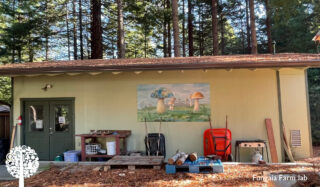
A Community-Based Cottage Business
On this day trip, I get to join Levon as he works to make an order for a local ranch owner of 50,000 wooden dowels inoculated with shitake mycelium. He’s a busy guy, so he is multi-tasking his work as he tells me about his evolution from a mushroom lover to a mushroom educator and how he is passionate about these organisms. As he loads up large scoops of water-soaked wooden dowels into bags used for sterilization, he explains that property owners are always looking for alternate revenue streams from their land and have an abundance of thickly growing stands of tan oak.
“The real clencher is when you start talking to property owners with acres and acres and acres of choked-out tan oak forest,” he says. “And you tell them, ‘I’ve tried growing a variety of mushrooms on tan oak, and the only thing that’s kicked ass is shitake’, and you tell them [their tan oak thinning] can make them money, and they can grow delicious protein-rich mushrooms.”
Fungaia Farm is a community-based cottage business providing all kinds of mushroom spawn and associated tools to feed your DIY mushroom obsession. Through their website, anyone can purchase plug spawn (inoculated wooden dowels for log culture), sawdust spawn, which can be used to create mushroom beds in your garden, or grain spawn, which acts as a “seeding” spawn to inoculate dowels or other substrates like coffee grounds, wheat straw, hardwood sawdust/shavings, and even cardboard. Also available are his infamous mushroom kits, which come ready to fruit gourmet edible mushrooms right on your kitchen counter.
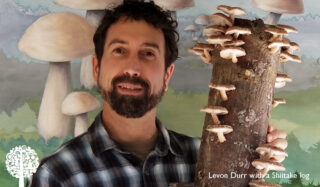
Novice & Expert Growers
Fungaia Farm provides fungi for novice and expert mushroom producers, but they also have products for those who want to enjoy these extraordinary species. They have spice mixes and mushroom gravy mix, and their medicinal mushroom tinctures can provide your body with various health benefits, but Levon is also passionate about education. He gives workshops on how-to for log culture, sterile culture techniques, and environmental restoration. Levon is passionate about what he does; his business has that energy and expertise on display. I asked him what he felt kicked off his love affair with mushrooms.
“Originally, it really started with just a broader sense of nature and spending time in nature,” he explains. “Then, I was introduced to the idea of wildcrafting and just being this young kid, out on my own at 17; I was selling blackberry jam on the corner at the farmers market or doing whatever I could to make a little money. But then, a buddy of mine teaches me that an Italian restaurant is forking over $10 per pound for mushrooms at the back of the restaurant. So, we started hiking all over, getting AAA plus mushrooms, like chanterelles, to sell to them. That was really the beginning, and David Arora’s book, which helped me expand into other edibles.”
He refers to David Arora, a mycologist dedicated to educating the public on edible and medicinal mushrooms. His books Mushrooms Demystified, All That the Rain Promises and More: A Hip Pocket Guide to Western Mushrooms will be a favorite for those who wish to learn the most satisfying skill of mushroom foraging.
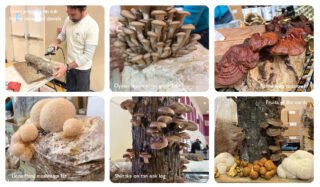
“Then in the late 90’s, I went to a Bioneers conference and saw Paul Stamets speak,” Levon says. “He was working on his Mycelium Running book and he just completed a hydrocarbon soil remediation project. was successful in remediating a few yards of soil contaminated by hydrocarbons using oyster mushroom mycelium. And again, there was that connection that said, I don’t need an engineering degree to do this. I don’t need to know anything but the basic biology of the lifecycle of this organism.”
Foraging Made Possible
Levon is right. Enjoying foraging or growing your own mushrooms without formal academic training is possible. Paul Stamets is a revolutionary mycologist who was largely self-taught. Still, his groundbreaking work earned an honorary doctorate from the National University of Natural Medicine in Portland, awards from the American Association for the Advancement of Science, and myriads of other accolades. Stamets has played a massive role in making fungi accessible and approachable to everyday people. Now, through Fungaia Farm, Levon is carrying that same torch and has devoted his life to connecting people to mushrooms and their environment.
“I’ve never had this fascination with just walking around trying to ID everything or DNA sequencing nature, and I can get frustrated with the academia folks when they get obsessive about ID’ing and memorizing massive amounts of Latin,” he says. “I mean, I always seem to find that the large percentage of the human population is interested in what they can eat. Don’t get me wrong, I appreciate the science, but I just don’t know what impact that’s having on the broader public’s appreciation of the natural world. When you can relate to people in that way, like, this is a delicious food, or this is an abundant resource that can be harvested without damaging the ecosystem, and you’re a part of it. It’s connecting this primal ancestral connection to the land that I feel is so important.”
A Green Solution
Levon and his business support people finding the edible joys of mushrooms. However, he is also a big proponent of mycotechnology, which are tactics that use fungi to restore the environment or provide a greener approach to development and land stewardship.
“There is so much diversity in what you can achieve with mycology,” he says. “ I’m working on mycelial building products with a contractor. I’m working on mycofiltration with folks from the biology and forestry world. I’m working on fire restoration with a tribe here in California. All the while, I am also growing medicinal and edible mushrooms to pay the bills.”
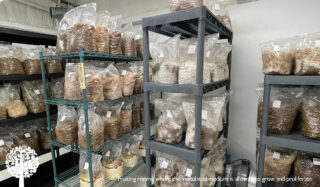
How fungi can be used is as diverse as these organisms. Emerging technologies based on biomimicry and enhancing ecosystem succession (the process in which the mix of species and habitat change over time) are fascinating. Levon has worked to clean up diesel-contaminated soil with mycoremediation, a strategy that harnesses fungi’s ability to deconstruct complex molecules and transform contaminants into a food source. Mycofiltration is an approach that uses the fine net of fungal hyphae to capture sediment and pollutants, which can help reduce water quality impacts. He has worked to support a local tribe in restoring their forest soils after fires. Yet, as much as he is a fan of these organisms, he also is pragmatic in his view that implementing these technologies is a complex and difficult challenge.
“People are always asking why these technologies aren’t more wildly used,” he says. “The challenge is when you take these living organisms, and all of a sudden throw them outside in all these different temperatures and humidity levels and environments. That’s super challenging.”
No One-Size-Fits-All
He also stresses that there is not one single winning strategy.
“I don’t believe that fungi are this silver bullet that is the answer to all our problems. I know we love that, it makes a great Instagram post, but I am wary of that approach. What’s the real practicality of [implementing these mycotechnologies]? Are fungi these amazing silver bullets for your health or the environment? No, but they are important pieces of the puzzle. We tend to break things into segments, we break things into categories, separate them, and we don’t see the interconnectedness.”
Fungaia Farm is a unique business with a mission to encourage folks to heal their relationships with nature, to go beyond science, and to teach people to relate to their environment in tangible everyday ways. The Fungaia Farm message is to empower yourself to use the tools nature has given us, that we can do this, and that we all should do this. Fungi can help heal our landscapes, bringing us food, medicine, clean soil, and clean water. But, most importantly, fungi show us the complexity and innate interconnectedness that all of nature possesses.
Please visit and support this man’s incredible work at Fungaia Farm website: fungaiafarm.com

